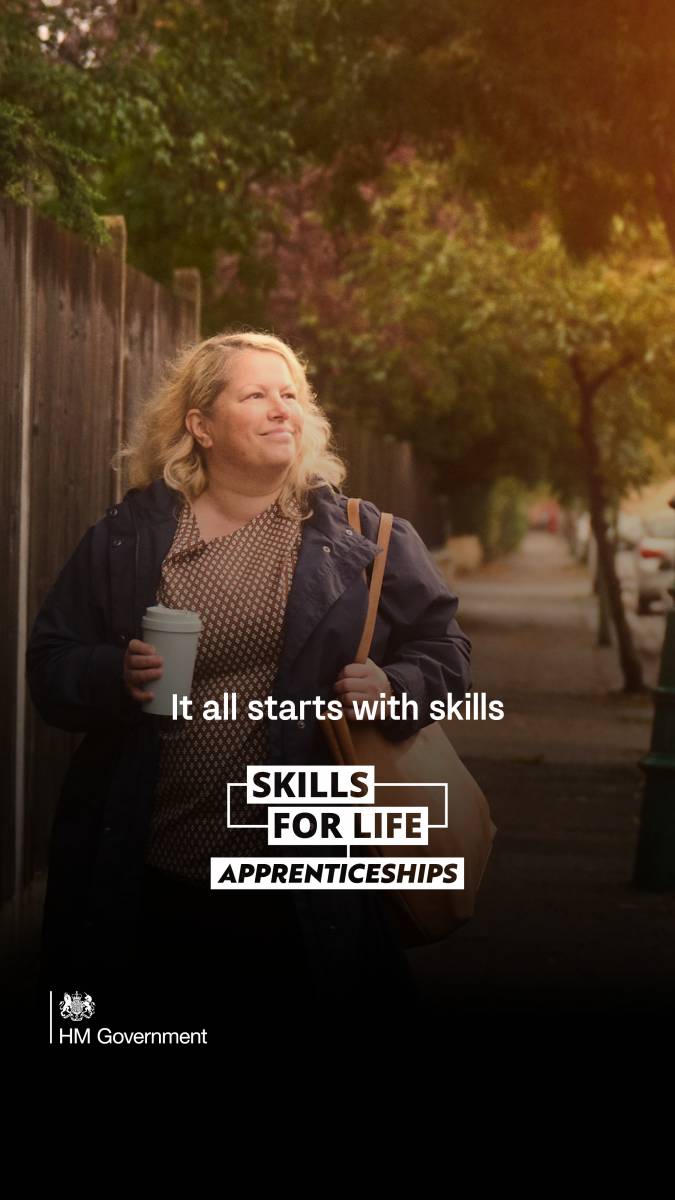Dorota Kabagambe loves being a physio apprentice and wants others to follow in her footsteps
Physiotherapy apprentice Dorota Kabagambe, 49, is one of a number of learners who are lined up to appear in a Department for Education campaign that aims to encourage people of all ages to make the most of their potential.
Dorota is based with the Community Neuro Service in the east London borough of Newham (see panel below for more information). In the campaign, which starts today (5 January), she will help to promote the Skills for Life ‘brand’ – which will be using social media, digital display and ‘out of home advertising’. The campaign also features an ‘emotive hero film' that will air on national TV, video on demand and in cinemas in England, as well as appearing on radio and outdoor billboards, and in media partnerships, until March.
Dorota said: ‘The campaign is inspired by people like me, each individual on a personal journey to gaining new skills and building a career for the future by harnessing their potential. It really brings to light how skills can change your life and highlights that there is something for everyone, including qualifications and courses you might never have heard of.
‘I’ve always had a passion for helping people which is why, when I came to the UK, I knew I wanted to be involved in the NHS. Government funded skills training has enabled me to boost my English and numeracy skills, which have in turn, led me to the apprenticeship I’m on now – which I absolutely love.'
Dorota's 'transformative journey'
Dorota added: ‘I’m a big advocate for adult learning and firmly believe if you’re passionate about something, go do it. I want more people to know about the resources out there that can help you to fulfil your skills journey. The Skills for Life website can help you find out more about the different options available and find what’s right for you.’
Robert Halfon, the minister for skills, apprenticeships and higher education, said: ‘Our new Skills for Life campaign features real learners who have gone on their own transformative journey like Dorota from London and who want to inspire others to have the confidence to follow in their footsteps. The campaign’s new one stop shop website will support even more people make informed choices and get all the information they need to take those important next steps needed for success.’
Government funded skills training has enabled me to boost my English and numeracy skills, which have in turn, led me to the apprenticeship I’m on now – which I absolutely love [Dorota Kabagambe]
The ‘It all starts with skills’ campaign aims tell young people, adults and businesses about the benefits of gaining technical qualifications, training and skills through a variety of routes in order to progress their careers and develop their businesses.
The multi-channel campaign highlights a range of technical education and training routes, with a particular focus on priority skills programmes such as apprenticeships, T Levels, Skills Bootcamps, Higher Technical Qualifications, Free Courses for Jobs, Multiply and essential skills (English, maths and digital), and support and advice from the National Careers Service.
To find out more about the campaign, or to explore your potential, search ‘Skills for Life or click
What is the Newham Community Neuro Service (CNS)?
The CNS is run by East London NHS Foundation Trust. The multidisciplinary team made of physiotherapy staff, occupational therapists, speech and language therapists and psychologists. It offers rehabilitation and management for people with neurological conditions, such as stroke. Therapy is provided in patients’ homes or in an appropriate community location.
The service provides specialist, coordinated advice and treatment to maximise independence, limit disease progression, reduce hospital admissions and facilitate smooth transition home following a hospital discharge.
The CNS also provides a modified early supported discharge (ESD) service – in which stroke specific rehabilitation is provided in the patient’s home with the level of rehabilitation being comparable to that offered to inpatients.
The ESD pathway provides a seamless transfer of care from hospital to home and allows patients to continue intensive rehabilitation in the home environment for a period of two weeks.
Author: Ian A McMillanShare it with















